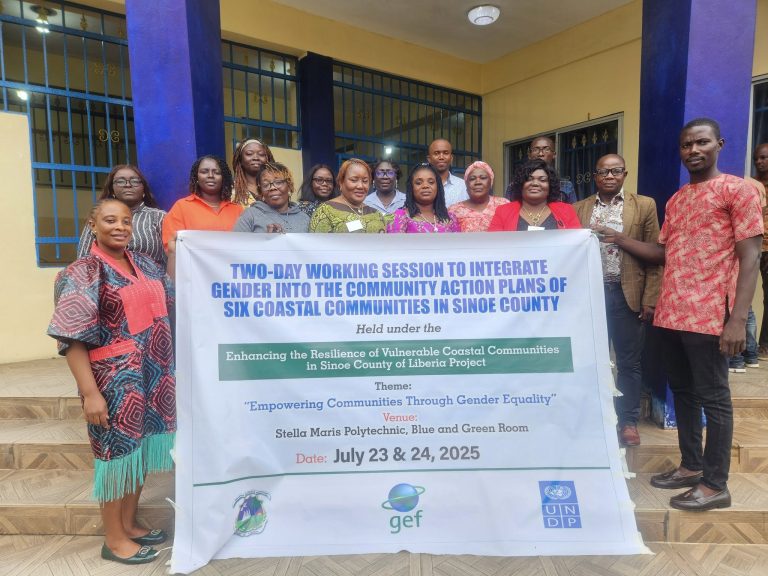Posts Categories
Latest Posts

Monrovia, Liberia, July 23, 2025 – The Environmental Protection Agency (EPA) of Liberia and its partners have begun a two-day working session aimed at integrating gender into the Community Action Plans (CAPs) of six vulnerable coastal communities in Sinoe County.
Held under the theme “Empowering Communities through Gender Equality,” the session is taking place at the Blue and Green Room of Stella Maris Polytechnic University in Monrovia from July 23–24, 2025.
The initiative is being implemented under the Enhancing the Resilience of Vulnerable Coastal Communities in Sinoe County of Liberia Project (ERVCCS). The project is supported through a grant from the Global Environment Facility (GEF), with co-funding from the United Nations Development Programme (UNDP) and in-kind support from the Government of Liberia.
The workshop focuses on the communities of Bafa Bay, Downtown Mississippi, Nanakru, Pungbor, Seebeh, and Tournata, all of which face growing environmental risks due to sea level rise, coastal erosion, and the broader impacts of climate change, alongside entrenched gender-based challenges.
Speaking during the opening of the session, Princess Aminata Blango-Doyah, Project Manager of the ERVCCS, welcomed participants and emphasized the importance of inclusive planning. According to her, the two-day session is intended to develop workable strategies that integrate gender into the CAPs of the targeted communities in Sinoe.
She acknowledged the presence of gender experts and community leaders, particularly highlighting the participation of the Sinoe County Women Forum and representatives from the Ministry of Gender, Children and Social Protection who traveled from Sinoe to support the effort.
“I want to thank all of our gender experts in the room for the support,” she said, adding, “We appreciate such collaboration with the people of Sinoe County.”
Madam Blango-Doyah also extended greetings on behalf of the EPA’s Executive Director, Dr. Emmanuel Yarkpawolo, and stressed the need for a broader understanding of gender. She noted that gender is often narrowly interpreted as referring only to women and girls, though other groups such as the elderly, youth, and persons with disabilities also face marginalization.
“Gender equality or gender mainstreaming is a driving component of many international development initiatives,” she stated, “which aim at creating opportunities for economic growth, reducing poverty, and improving household well-being, health, and education.”
She urged participants to bring forward innovative and practical ideas that would yield lasting results, and commended the Sinoe project team for making the session possible.
The session brings together representatives from various sectors including agriculture, gender, environment, commerce and industries, and community development as well as local NGOs and ERVCCS staff. Participants will engage in presentations, group discussions, and strategy planning, all geared toward identifying gender-specific needs and creating actionable strategies that promote inclusion and resilience.
